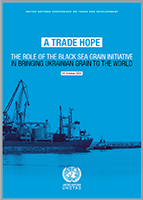As two of the world’s largest suppliers of grain, Ukraine and the Russian Federation are important sources of food for many developing countries. However, the war brought grain exports from Ukraine to an almost grinding halt and slowed down exports of grain and fertilizers from the Russian Federation.
Faced with the threat of food insecurity for millions of people around the world, on 22 July, 2022, the United Nations brokered two initiatives.
The first is the memorandum of understanding between the UN and the Russian Federation to facilitate unimpeded access for their food and fertilizers exports to global markets.
The second, and the focus of this analysis, is the Black Sea Grain Initiative (BSGI) signed by the UN, the Russian Federation, Türkiye and Ukraine to resume Ukrainian grain exports via the Black Sea amid the war.
In a short space of time, the BSGI has gathered momentum. Port activity in Ukraine is picking up and large shipments of grain are reaching world markets.
The Initiative has helped to stabilize and subsequently lower global food prices, and move precious grain from one of the world’s breadbaskets to the tables of those in need. However, with the BSGI ending in just over a month and its renewal uncertain, the price of some commodities, such as wheat and maize, is rising again.
Without The Initiative, there is little hope for providing food security, especially for developing and least-developed countries.



